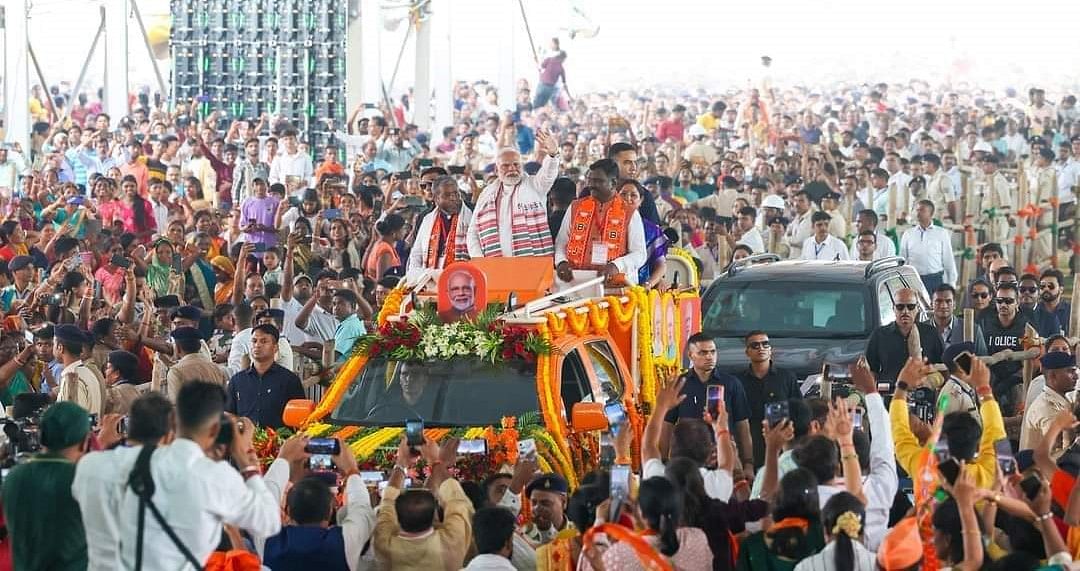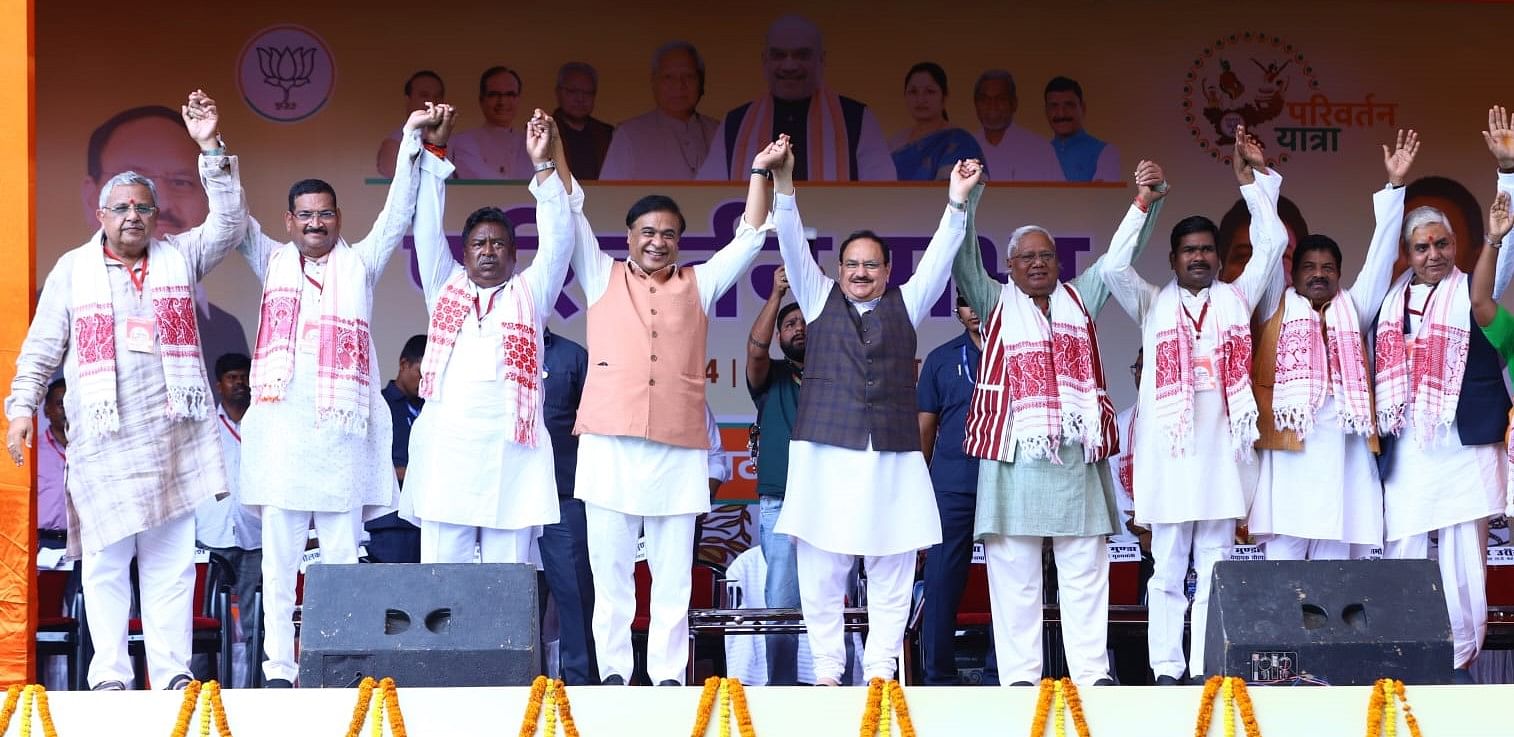Ranchi: As the Bharatiya Janata Party (BJP) took an unassailable lead over the Congress as the counting of votes was underway in Haryana on 8 October, Jharkhand BJP president Babulal Marandi, along with party workers, celebrated with drumbeats in Ranchi. “The people of Haryana have approved of Prime Minister Modi’s campaign to end corruption. Jharkhand and Maharashtra will also have similar results,” he told mediapersons.
The Haryana verdict has come as a big morale booster for the BJP in Jharkhand after an underwhelming performance in the 2024 Lok Sabha elections, where the Congress and the Jharkhand Mukti Morcha (JMM) managed to win five seats, three more than its 2019 tally.
The ruling JMM-led alliance, which includes Congress, saw its cumulative vote share go up by a little over 6 percent, compared to 2019, while the National Democratic Alliance’s (NDA) vote share dipped by around 9 percent.
Jharkhand is set to go to the polls later this year. But according to BJP leaders, the party’s biggest issue is the lack of strong local leadership in the state.
Two months after its loss in the 2019 Jharkhand assembly elections, the BJP had brought Marandi—a former leader of the party who was the state’s first CM—back into the fold by merging his Jharkhand Vikas Morcha with itself. In the seven assembly bypolls that were held over the next five years, the Congress-JMM won six, while BJP ally All Jharkhand Students Union won one.
In addition, the loss of the five seats reserved for the Scheduled Tribes in the Lok Sabha polls, including the one held by then Union minister Arjun Munda, has triggered concerns about how Marandi and other local leaders are faring.
The BJP has sought to address these concerns by involving national leaders. Prime Minister Narendra Modi has visited Jharkhand twice in the past few weeks. His last trip was on 2 October, at the conclusion of the party’s 11-day Parivartan Yatra.
More than a dozen Union ministers, chief ministers and deputy chief ministers of other states, as well as MPs, led the meetings during this yatra.

They included BJP national president J.P. Nadda, the party’s Jharkhand poll in-charge and Union agriculture minister Shivraj Singh Chouhan, defence minister Rajnath Singh, the chief ministers of Madhya Pradesh, Rajasthan and Uttarakhand—Mohan Yadav, Bhajanlal Sharma and Pushkar Singh Dhami—Leader of the Opposition in the West Bengal assembly Suvendu Adhikari, and MPs Manoj Tiwari and Ravi Kishan, among others.
Political analyst Baijnath Mishra told ThePrint, “Hemant Soren has established himself strongly in state politics. In the current political scenario, no single BJP leader in the state is capable of pushing him back and snatching power. The party’s central leadership knows very well that the leaders in the state cannot take the election boat across. The results of the Lok Sabha elections have also revealed a lot.”
According to Sambhunath Choudhary, a visiting faculty member at the mass communication department of Ranchi’s Dr. Shyama Prasad Mukherjee University, the results in Haryana have the BJP excited, but there are two key challenges before the party, which the central leadership has sensed—regaining lost ground in tribal areas and stopping the growing hold of JMM in unreserved constituencies.
“That is why the election campaign activities led by BJP’s national leaders and those from other states have intensified in Jharkhand. It clearly indicates that the BJP is virtually centralised and state leaders will remain in the second-fiddle role,” he told ThePrint.
Sameer Oraon, former MP and national president of the BJP’s Scheduled Tribes Morcha, said that the action plan for the state is being devised in consultation with the top leadership. “We are constantly engaged in organisational work. In view of the elections, programmes and strategies are decided with the knowledge of the top leadership. It has been our tradition to contest elections with full intensity. The BJP has a very big family and leaders from one state are sent to others. Therefore, the participation of central leaders in the BJP’s Parivartan Yatra is natural.”

Taking a jibe at the BJP, Chief Minister Soren said that the party has no leaders in Jharkhand and therefore, has to hire from other states to handle the political situation. “Many chief ministers, Union ministers, ex-chief ministers and the prime minister are trying to remove a tribal chief minister,” he remarked.
However, after the Haryana results, the alliance leadership did seem jolted as Soren rushed to Delhi the very next day to meet Congress leaders Mallikarjun Kharge and Rahul Gandhi.
In Haryana in 2014, Manohar Lal Khattar was named the chief minister as part of BJP’s strategy to mobilise non-Jat voters. The party had employed a similar approach in Jharkhand that year by picking Raghubar Das, a non-tribal, to lead the government in a state with a tribal-dominated political landscape. The strategy did not pay off in 2019 as the party failed to secure a clear majority in Haryana and lost power in Jharkhand.
However, with the same plan of action working in Haryana this time, the Congress-JMM alliance in Jharkhand may have reasons to worry, even though the BJP recalibrated its approach in the state after the loss in 2019 and appointed Marandi, a tribal, as the state unit chief.
The BJP’s Amar Kumar Bauri, leader of the Opposition, said, “The foolproof strategy in Haryana proved to be surprising. In Jharkhand, too, the party has gone a long way in its preparations. The result in Haryana will have an impact on the elections in Maharashtra and Jharkhand.”
However, Jharkhand Congress president Keshav Mahto Kamlesh said his party would not make any mistakes. “The political situation in Jharkhand is different from Haryana and so is the equation of votes.”
(Edited by Mannat Chugh)
Also Read: With 16 Jharkhand visits in 3 months, ‘infiltrator’ rhetoric, Himanta emerges as thorn in JMM’s side













